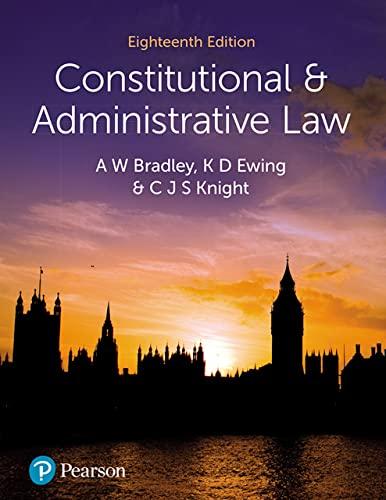Question
6. Clive is a big-time actor in Hollywood. He contracts with Paula Producer to give Producer his exclusive services for the next seven months to
6. Clive is a big-time actor in Hollywood. He contracts with Paula Producer to give Producer his exclusive services for the next seven months to film a new political thriller. Clive was to be the featured star of the film. Just a few days after signing that contract, however, Clive signs a contract to make a Marvel superhero movie. The filming schedules overlap by two months. In order to do both movies, Clive will have to divert significant attention from Producer's movie, in the final two months of its filming. Producer brings suit for specific performance to compel Clive to exclusively make her movie. Assume that Producer prevails on the merits. Which of the following statements is most accurate: A. Paula Producer will likely prevail because she hired Clive for his unique and particular acting talents and those talents cannot be replaced by an award of monetary damages. B. Paula Producer will likely lose because Clive can still complete both projects and she cannot prove that her project will meaningfully suffer. C. Paula Producer will likely prevail because Clive was under a preexisting duty to her. D. Paula Producer will likely lose because the contract calls for personal services and Clive cannot be forced to provide such services.
7. Douglas was hired by Veritas Adventures to build a new wizard-themed adventure park for $25 million. Douglas anticipated that it would cost $21 million in labor and materials to finish the job. After completing the initial grading of the land and about three-quarters of the required preparatory work for the park, at a cost of $750,000, Douglas was contacted by Veritas and told to "immediately stop all work." Veritas explained that it was on the verge of bankruptcy and needed to conserve cash, "at least until we can work out a bridge loan." Veritas went on to say that it "hoped it could get the project back on track" but it ended by saying that there was a non-trivial possibility that the project would never be able to be finished.
Douglas decided that he would finish at least the preparatory work for the park at a cost of $350,000. He rationalized this as a smart decision. If Veritas was able to get the bridge loan and restart the project, having the preparatory work done would preserve the state of the project. If, on the other hand, Douglas left the project in its current state, depending on how long the delay was, much of the value of the preparatory work could be undone by weather and neglect, resulting in up to $100,000 or so of additional preparatory work, to essentially redo what had already been done. Imagine that Veritas never gets the bridge loan but that Douglas does finish the preparatory work for $350,000. Imagine that Veritas had paid Douglas a down payment of $1 million and progress payments of $250,000. Imagine further that Douglas brings a lawsuit against Veritas for breach and prevails on liability. Which of the following statements is most accurate. A. Douglas should recover $3.5 million. B. Douglas should recover $5.1 million. C. Douglas should recover $4.4 million. D. Douglas should recover 3.85 million.
8. Vincent agrees to sell his beloved manor house in upstate New York for $1.5 million to his dear friend Mildred, closing on September 1. Mildred promptly gets the house appraised, at a cost of $5,000, and discovers that it is really worth $1.9 million. She also learns that she can acquire a 25-acre parcel of property next to the manor house for a great price -- $350,000. If she combines the manor house and its land with the new parcel of property, and builds a horse stable on the new parcel for $100,000, the appraiser says that the combination would be worth $2.7 million. Mildred promptly pays a $15,000 option fee on the neighboring 25-acre parcel, giving her the ability to exercise the option through August 20. Mildred then hires an architect to begin designing a horse stable, at a cost of $10,000. On August 20, Mildred signs a purchase agreement for the 25-acre parcel. On August 25, Vincent anticipatorily repudiates. Assume that Mildred sues Vincent and wins on liability. What are Mildred's likely recoverable damages? A. $1.2 million B. $1.55 million C. $420,000 D. $400,000 E. $760,000
9. A farmer who wanted to sell her land received a letter from a developer that stated, "I will pay you $1,100 anacre for yourland." The farmer's letter of reply stated, "I accept your offer." Unbeknownst to the farmer, the developer had intended to offer only $1,000 per acre but had mistakenly typed "$1,100." As both parties knew, comparable land in the vicinity had been selling at prices between $1,000 and $1,200 per acre. A. There is no contract, because the parties attached materially different meanings to the price term. B. There is no enforceable contract, because the developer is entitled to rescission due to a mutual mistake as to a basic assumption of the contract. C. There is a contract formed at a price of $1,000 per acre. D. There is a contract formed at a price of $1,100 per acre.
Step by Step Solution
There are 3 Steps involved in it
Step: 1

Get Instant Access to Expert-Tailored Solutions
See step-by-step solutions with expert insights and AI powered tools for academic success
Step: 2

Step: 3

Ace Your Homework with AI
Get the answers you need in no time with our AI-driven, step-by-step assistance
Get Started


